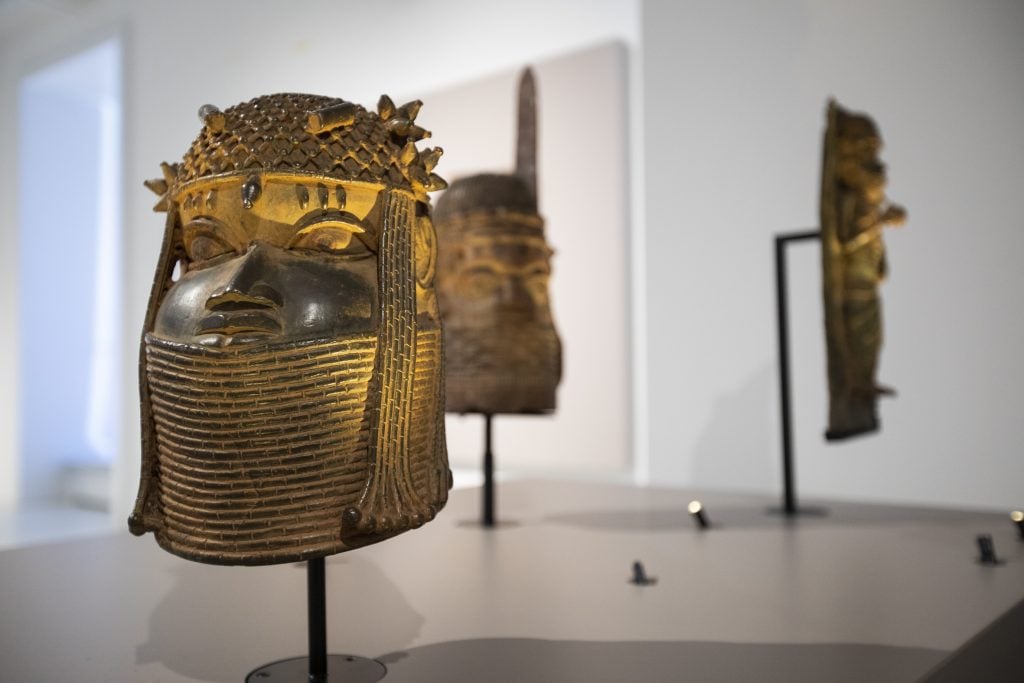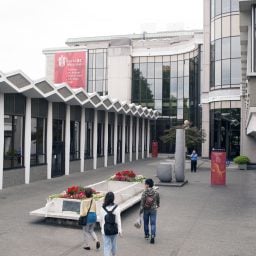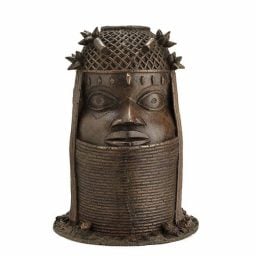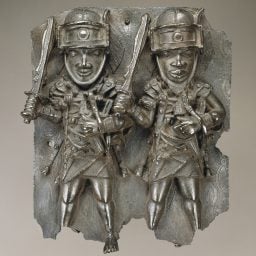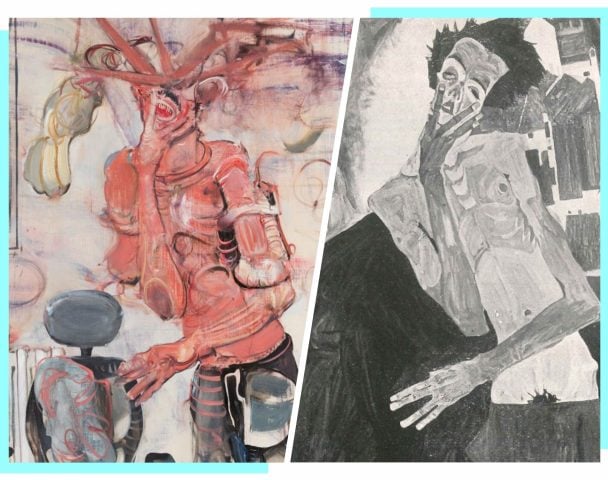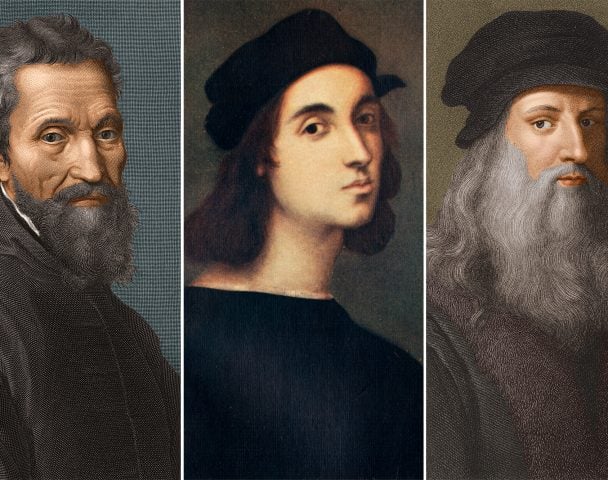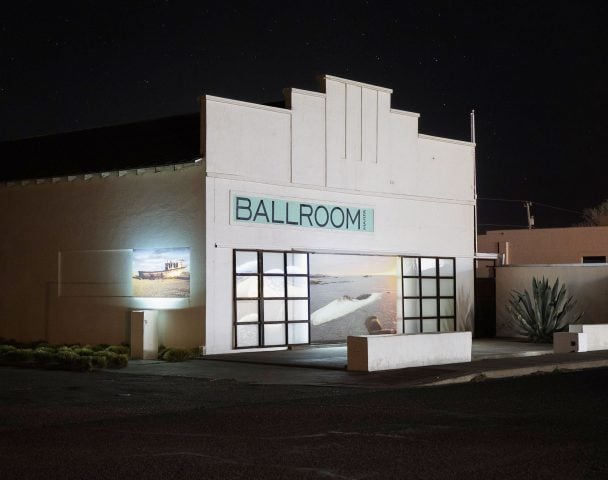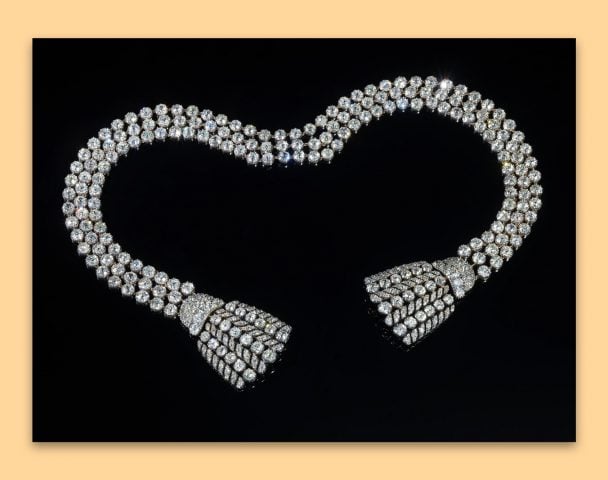Germany’s landmark announcement that it would begin to restitute Benin bronzes as soon as 2022 sent ripples through museum communities around the world. The contentious objects, known to have been looted from the Benin Royal Palace in 1897, are scattered across some of the most prominent museums the world over. From institutions like the Metropolitan Museum in New York, which holds 163 pieces, to the University of Pennsylvania’s Museum of Archaeology and Anthropology, which holds 100 pieces, these treasures have become a focal point of debate in recent years over the restitution of ill-gotten goods from the colonial era.
All told, there are some 160 institutions holding Benin bronzes, a term for an array of pieces that span intricate bronze plaques, carved wood, and ivory objects. Nigeria has been actively pursuing their return, an initiative that has ramped up in recent years as plans have come together for a major museum to hold them, the Edo Museum of West African Art, in Benin City. It is due to open in 2025.
Artnet News reached out to 30 museums known to hold Benin bronzes to ask for an update on their position on restitution, and the status of objects in their collection.
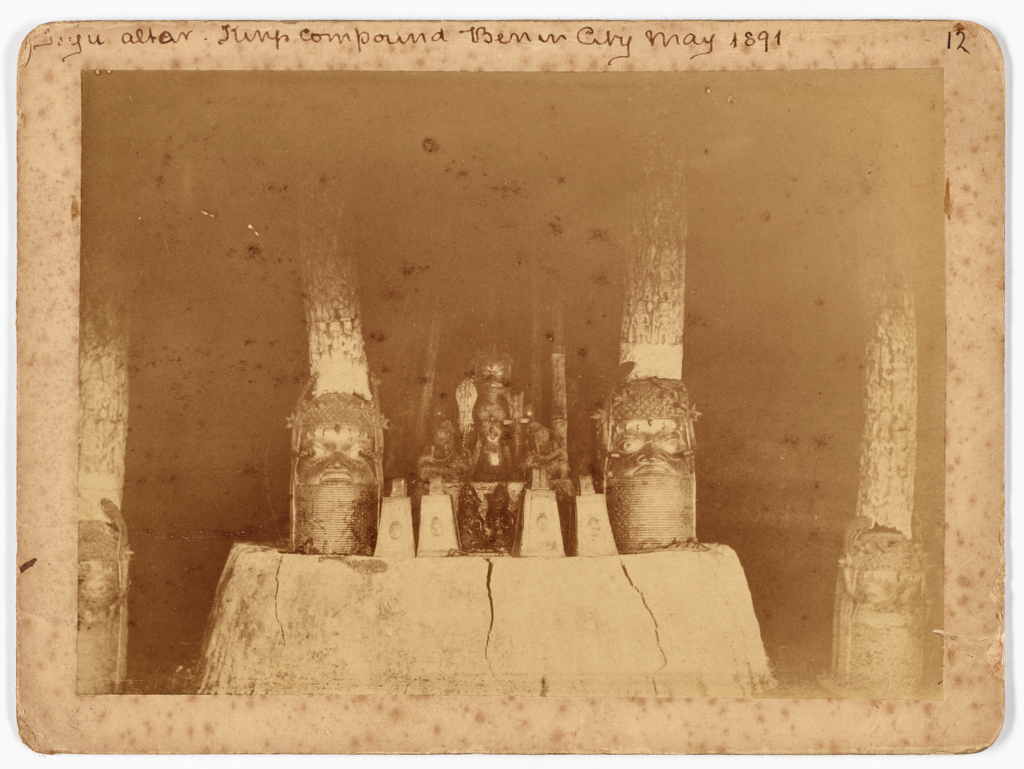
Photograph of an ancestral shrine at the Royal Palace, Benin City taken during the visit of Cyril Punch in 1891. Eliot Elisofon Photographic Archives, National Museum of African Art, Smithsonian Institution.
British Museum, London
Number of Benin bronzes: 928
Position on restitution: “We believe the strength of the British Museum collection resides in its breadth and depth, allowing millions of visitors an understanding of the cultures of the world and how they interconnect over time—whether through trade, migration, conquest, or peaceful exchange…The British Museum works in partnership with colleagues, communities, and organisations across the world. We are currently collaborating with the Legacy Restoration Trust in Nigeria and Adjaye Associates on a major new archaeology project linked to the construction of the Edo Museum of West African Art. This innovative collaboration will investigate the archaeology of the Kingdom of Benin, including archaeological remains buried below the proposed site of the new museum. The Edo Museum will reunite Benin artworks from international collections. The Benin Dialogue Group, of which the British Museum is a member, will work with the museum to help develop this new permanent display of Benin works of art.”
Status of restitution requests or returns: No comment given
Initiatives of which the museum is a part: Member of the Benin Dialogue Group
Weltmuseum, Vienna
Number of Benin bronzes: 173, including 13 of which have been proven to have have left the Kingdom of Benin as a direct result of the 1897 invasion. Eight others were acquired significantly before 1897 and were part of the Habsburg collections since the 16th century.
Position on restitution: “The Weltmuseum Wien has been following developments in Germany and other European countries regarding the return of objects from the Benin Kingdom to Nigeria very closely. The collections of the Weltmuseum Wien remain the property of the Republic of Austria. The museum itself is not therefore authorized to make decisions regarding the return or deaccessioning of objects. Such decisions are made by federal government authorities in consultation with the museum… The museum has also committed to ensuring that Benin works from its collection are shown in Benin City; to be fully transparent to our Nigerian partners and the public about the objects in Vienna; and to continue to research the provenance and significance of the objects themselves.”
Status of restitution requests or returns: No formal request has been made for the return of these objects
Initiatives of which the museum is a part: Member of the Benin Dialogue Group and Digital Benin
Museum of Archaeology and Anthropology, Cambridge, UK
Number of Benin bronzes: 136
Position on restitution: “In 2019, the museum developed a new framework for the return of artifacts. The policy notes that consideration will be given to whether artifacts were ‘appropriated in the aftermath of violence, for example in the context of a colonial intrusion or war.’ Over recent years, staff have visited Benin City, and Benin representatives have visited Cambridge.”
Status of restitution requests or returns: “No claim has yet been made for the return of Benin works, but it is anticipated that a proposal to return artifacts will in due course be made and considered through the process set out in the policy. Given the published criteria, it is anticipated that the claim would be supported and steps taken to return the artifacts.”
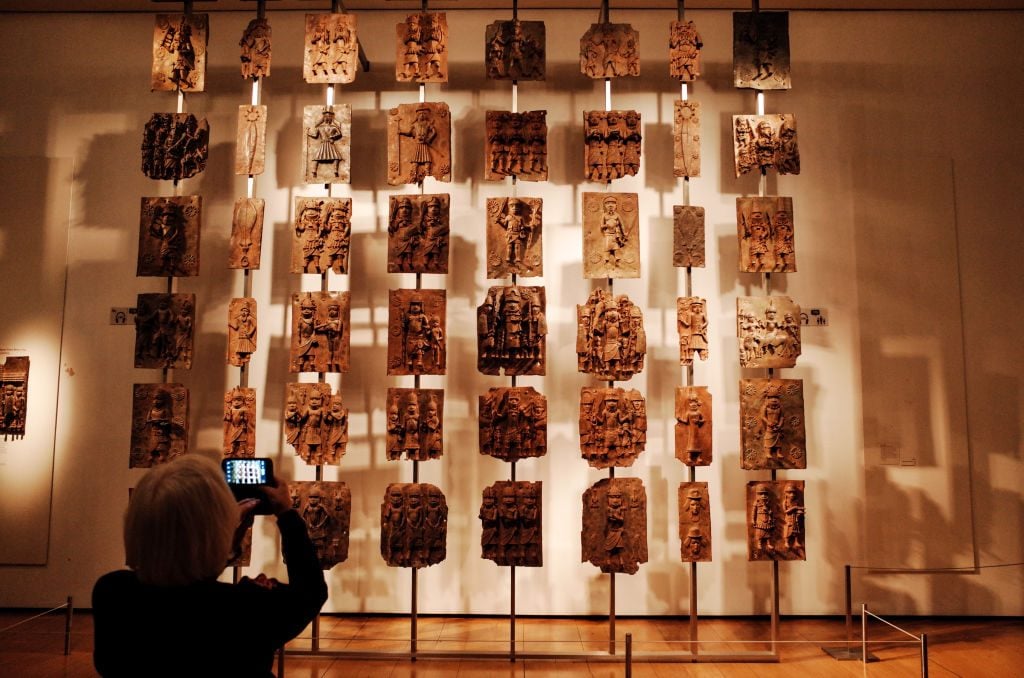
A visitor takes photos of the contentious Benin bronzes that are on display at the British Museum in London. Photo: David Cliff/SOPA Images/LightRocket via Getty Images.
Oxford University’s Gardens, Libraries and Museums
Number of Benin bronzes: 105
Position on restitution: “The Pitt Rivers Museum has been working with Nigerian stakeholders, including representatives of the Royal Court and the Legacy Restoration Trust, to identify best ways forward regarding the care and return of these objects from the Court currently in the museums’ care… We acknowledge the profound loss the 1897 looting of Benin City caused and, alongside our partners of the Benin Dialogue Group, we aim to work with stakeholders in Nigeria to be part of a process of redress.”
Status of restitution requests or returns: No comment given
Initiatives of which the museum is a part: Member of the Benin Dialogue Group
National Museums Scotland, Edinburgh
Number of Benin bronzes: 74
Position on restitution: “Our current policy on requests for the return of objects to their country or location of origin is that we consider each on a case by case basis.”
Initiatives: Benin Dialogue Group
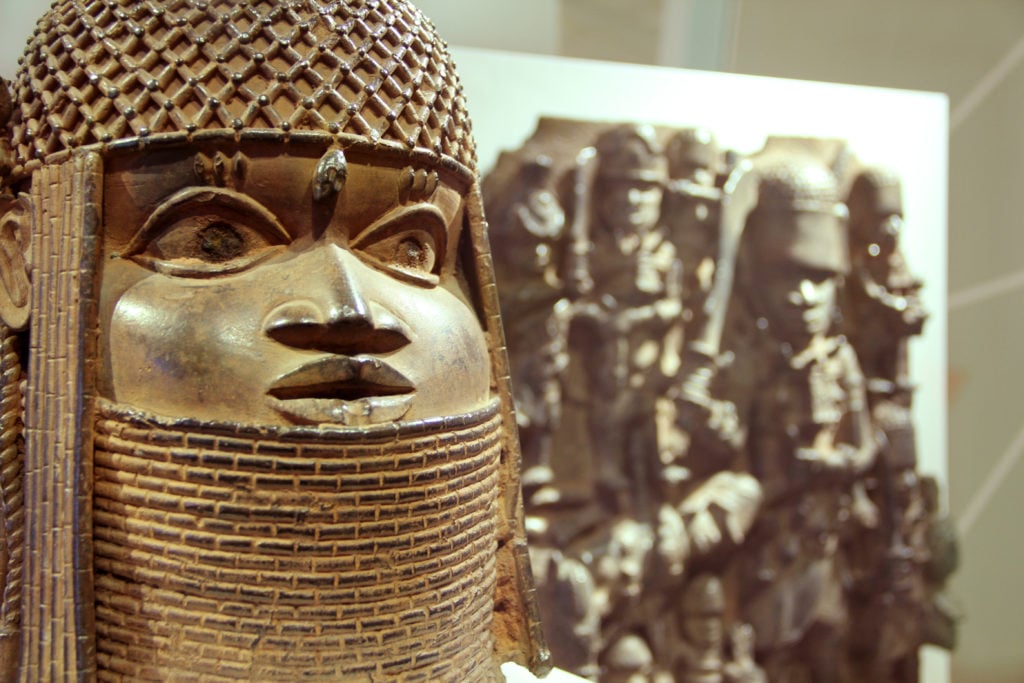
Exhibition view of “Looted Art? The Benin Bronzes” at MKG in Hamburg. Photo by Michaela Hille.
Horniman Museum, London
Number of Benin bronzes: 50 objects, including 15 brass plaques
Position on restitution: “Any returns, including the future of its collection of objects from Benin City, is laid out in our Restitution and Repatriation Policy, published on our website. The policy sets out a clear procedure for repatriation claims and includes a commitment to sharing information and transparency of process. The Horniman has, at the time of writing, received no repatriation requests which means that no definitive decision has been reached about repatriation of any object.”
Status of restitution requests or returns: None
Initiatives of which the museum is a part: Partner in the Rethinking Relationships and Building Trust around African Collections project
National Museum of Ireland, Dublin
Number of Benin bronzes: 21 objects, including armlets, wooden paddles, figures, and a staff
Position on restitution: “Like so many museums that were opened in the 19th century, the museum has legacy collections that do not reflect contemporary collecting practice or ethics. The National Museum of Ireland is committed to engaging with colleagues and officials in Nigerian museums, to progress a restitution process in relation to the Benin Bronzes… All of this work will be further supported through a comprehensive strategy which is underway within the museum to fully investigate and adequately resource provenance research of the wider 15,000 object ethnographical collection.”
Status of restitution requests or returns: No comment given
Initiatives of which the museum is a part: Member of Digital Benin
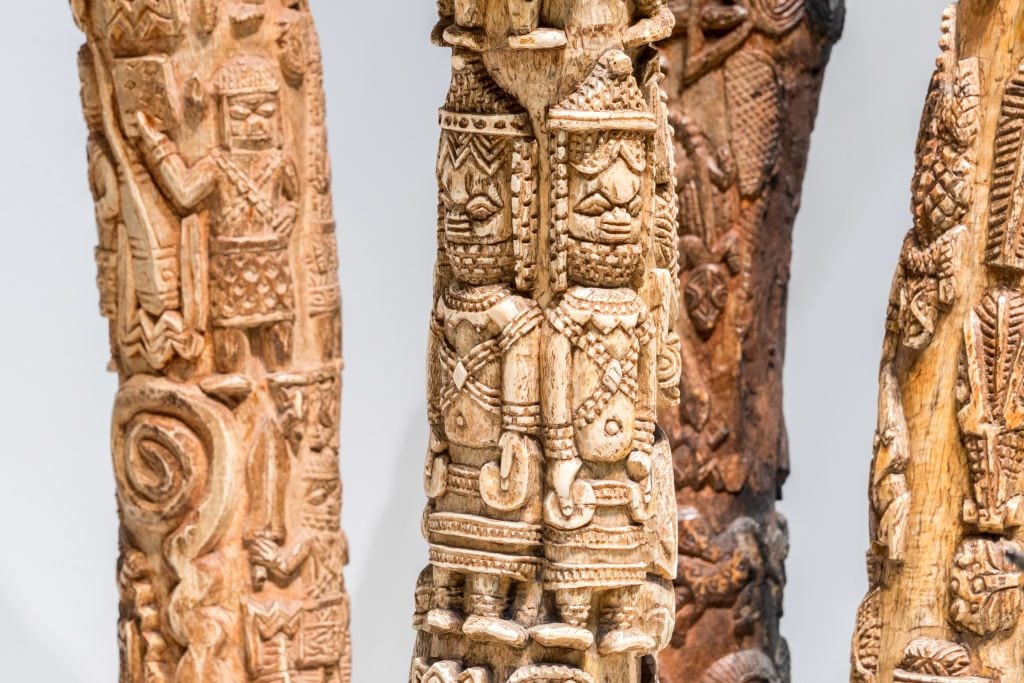
Carved elephant tusks looted by British soldiers from the Kingdom of Benin in 1897 are displayed in the “Where Is Africa” exhibition at the Linden Museum on May 05, 2021 in Stuttgart, Germany. Photo: Thomas Niedermueller/Getty Images.
Museum of Anthropology at the University of British Columbia, Vancouver
Number of Benin bronzes: 20, including 14 of which have been identified as recent replicas and six which may be older
Position on restitution: “The Museum of Anthropology at UBC has been engaged in repatriation since the 1990s. We strive to fulfil repatriation as established by the UNDRIP, the Calls to Action from the Truth and Reconciliation Commission of Canada, and the UBC Strategic Indigenous Plan, reflected in UBC and MOA’s policies, namely the Guidelines for Repatriation.”
Status of restitution requests or returns: None
Initiatives of which the museum is a part: Digital Benin
Museum of Cultures, Basel
Number of Benin bronzes: 20 objects from Benin City, including 16 brass objects, two ivory pieces, and two wooden objects.
Position on restitution: It welcomes any request and open-ended dialogue
Status of restitution requests or returns: None
Initiatives of which the museum is a part: Benin Dialogue Group, Benin Digital, and the Swiss research group Benin Initiative Switzerland
National Museum of African Art at the Smithsonian, Washington, D.C.
Number of Benin Bronzes: 43 objects. Sixteen pieces are confirmed to have been raided in 1897 and 23 further artifacts that have an unclear provenance.
Position on restitution: “Members of the royal kingdom of Benin have visited the museum over the years, touring our exhibitions and collections storage and viewing the photographs relevant to the kingdom in our photographic archives. The museum has had a strong relationship with Oba and members of the royal court of Benin over the years. They are aware of the objects in our collection and appreciate that we continue to tell the story about how the kingdom’s treasures were looted from the palace in 1897. The National Museum of African Art is aware of the Legacy Restoration Trust in Nigeria, but we are not part of the Benin Dialogue Group associated with that trust and the formation of a new museum devoted to the royal arts of Benin.”
Status of restitution requests or returns: None
Initiatives of which the museum is a part: Digital Benin
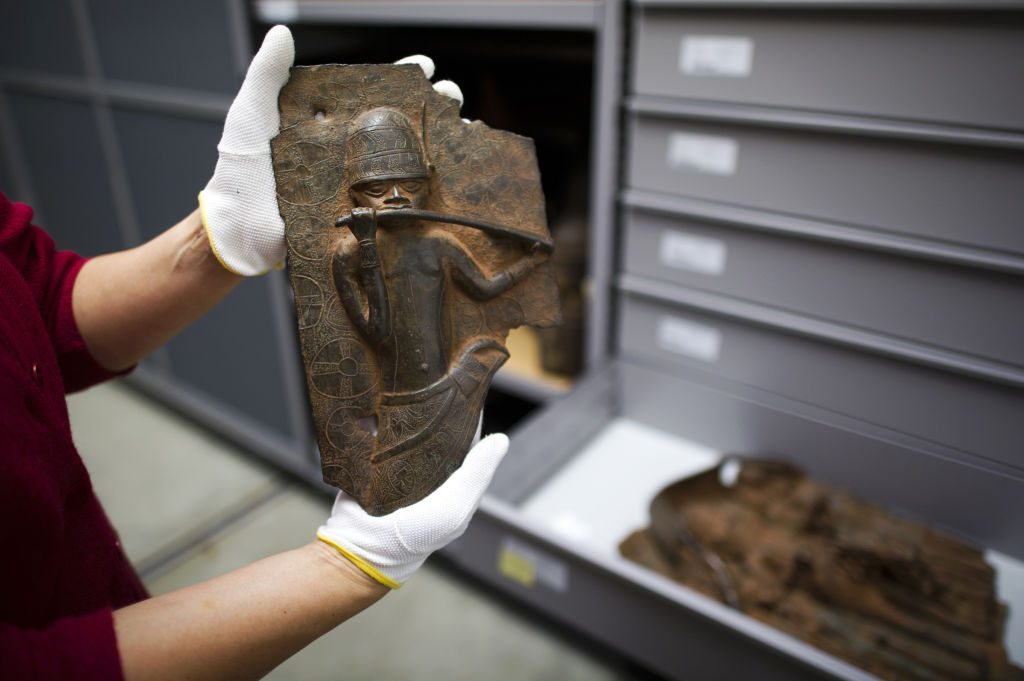
A small brass relief plate from the Benin Empire depicting royal hornblowers from a drawer of a rolling shelf in the depot of the Dresden State Art Collections in Dresden. Photo: Arno Burgi/picture alliance via Getty Images.
Glasgow Museums, Glasgow
Number of Benin bronzes: Eight bronzes and 21 other cultural artifacts whose exact provenance has not been established, including objects typically placed on the ancestral altars of the Obas of Benin that are currently attributed to late 19th-century Edo culture
Position on restitution: “Glasgow will continue to build on its established approach to restitution, founded on constructive engagement, with the people of Glasgow and the descendent communities or nations making the request, to support each individual situation. Moving forward Glasgow Life, on behalf of Glasgow City Council, will consider the most appropriate way to directly instigate discussions with descendant communities or their nominated representatives, whenever we can identify them, by sharing all relevant information that we have. Through cultural agencies in Nigeria, Glasgow Life, has established a pathway of communication with the Royal Family of Benin, and as a result we are in a position to begin a dialogue.”
Restitution requests: 9 repatriation requests, six of which have been successful
Initiatives of which the museum is a part: Digital Benin, the PRM Devolving Restitution Project, and the Commonwealth Association of Museums
Cleveland Museum of Art
Number of Benin bronzes: Eight objects, including five thought to have been removed from the Benin Kingdom during the Siege of Benin of 1897 and three Benin works needing further research.
Position on restitution: “As all of these works are undergoing further research; the museum is not in a position to make a statement as to any future actions. The Cleveland Museum of Art’s profound commitment to transparency and the highest ethical standards is apparent both from the way that our curator of African arts has interpreted these works in our galleries and from our long track record of engagement around cultural property issues.”
Royal African Museum, Tervuren, Belgium
Number of Benin Bronzes: One
Position on restitution: “In the ongoing debate regarding the restitution of African cultural heritage, the museum takes an open and constructive position. It is an active participant in the dialogue with authorities and museum policy representatives, and with Belgians of African descent from the relevant countries. The RMCA acknowledges that it is not normal for such a large part of African cultural heritage to be found in the West, given that the countries of origin have moral ownership of such heritage… From a legal standpoint, the collections of the RMCA are the inalienable property of the federal state and belong to federal heritage. Restitution can only be decided upon by the federal minister for Science Policy within a strict legal framework and would require approval by parliament… There is currently no legal framework for restitution in Belgium.” Read full policy here.
Status of restitution requests or returns: No formal requests for restitution
Initiatives: Involved in a dialogue with the National Museum of Congo and of Rwanda to discuss a program of long-term collaboration and restitution.
Royal Ontario Museum, Toronto, Canada
Number of Benin Bronzes: One object with a confirmed provenance
Position on restitution: “The ROM adheres to the Museum’s Collections Policy which follows accepted museum standards and guidelines on the deaccessioning of objects.”
Status of restitution requests or returns: None
Initiatives: Benin Dialogue Group
